
FACULTY OF ENGINEERING
Department of Genetics and Bioengineering
GBE 201 | Course Introduction and Application Information
| Course Name |
Microbial Biotechnology
|
|
Code
|
Semester
|
Theory
(hour/week) |
Application/Lab
(hour/week) |
Local Credits
|
ECTS
|
|
GBE 201
|
Fall/Spring
|
2
|
2
|
3
|
6
|
| Prerequisites |
None
|
|||||
| Course Language |
English
|
|||||
| Course Type |
Service Course
|
|||||
| Course Level |
First Cycle
|
|||||
| Mode of Delivery | - | |||||
| Teaching Methods and Techniques of the Course | - | |||||
| Course Coordinator | ||||||
| Course Lecturer(s) | ||||||
| Assistant(s) | ||||||
| Course Objectives | The aim of this course is to get familiar with wild type and transgenic microorganisms which are used in industry and their use in agro-, medical and environmental biotechnology. |
| Learning Outcomes |
The students who succeeded in this course;
|
| Course Description | Microorganisms and their use in agriculture, medical and environmental industries |
|
|
Core Courses | |
| Major Area Courses |
X
|
|
| Supportive Courses | ||
| Media and Management Skills Courses | ||
| Transferable Skill Courses |
WEEKLY SUBJECTS AND RELATED PREPARATION STUDIES
| Week | Subjects | Related Preparation |
| 1 | Introduction to microbial biotechnology | Microbial Biotechnology: Principles and Applications - Part 1 Chapter 1 |
| 2 | Microbial metabolism and fermentation | Microbial Biotechnology: Principles and Applications - Part 1 Chapter 1 |
| 3 | Environmental factors that influence microorganisms | Microbial Biotechnology: Principles and Applications - Part I Chapter 4 |
| 4 | Screening for Microbial Products | Microbial Biotechnology: Principles and Applications - Part I Chapter 4 |
| 5 | Plasmids and restriction enzymes | Microbial Biotechnology: Principles and Applications - Part I Chapter 4 |
| 6 | Recombinant DNA Technology | Microbial Biotechnology: Principles and Applications – Part I Chapter 2 |
| 7 | Midterm Exam | |
| 8 | Bioprocess Technology | Microbial Biotechnology: Principles and Applications – Part I Chapter 2 |
| 9 | Bioprocess Technology | Microbial Biotechnology: Principles and Applications - Part III |
| 10 | Microbes in Environmental Biotechnology | Microbial Biotechnology: Principles and Applications - Part IV |
| 11 | Bacteria: Old and New Health Tools | Microbial Biotechnology: Principles and Applications - Part IV |
| 12 | Bacteria as Environmental Tools | Microbial Biotechnology: Principles and Applications - Part III-V |
| 13 | Project presentation | Microbial Biotechnology: Principles and Applications - Part VI |
| 14 | Project presentation | Articles |
| 15 | Review of the semester | |
| 16 | Final Exam |
| Course Notes/Textbooks | Kun Lee, Yuan. Microbial Biotechnology: Principles and Applications,World Scientific Publishing Company, 2013. |
| Suggested Readings/Materials | 1. Microbiology: A system's Approach, Third Edition by Marjorie Kelly Cowan, Miami University. ISBN: 007352252. McGraw-Hill Science/Engineering/Math
2. Microbiology: Pearson New International Edition: A Laboratory Manual, 10/E by James Cappuccino&Natalie Sherman. ISBN-13: 9781292040394
|
EVALUATION SYSTEM
| Semester Activities | Number | Weigthing |
| Participation | ||
| Laboratory / Application |
1
|
30
|
| Field Work | ||
| Quizzes / Studio Critiques | ||
| Portfolio | ||
| Homework / Assignments | ||
| Presentation / Jury |
1
|
15
|
| Project | ||
| Seminar / Workshop | ||
| Oral Exams | ||
| Midterm |
1
|
25
|
| Final Exam |
1
|
30
|
| Total |
| Weighting of Semester Activities on the Final Grade |
3
|
70
|
| Weighting of End-of-Semester Activities on the Final Grade |
1
|
30
|
| Total |
ECTS / WORKLOAD TABLE
| Semester Activities | Number | Duration (Hours) | Workload |
|---|---|---|---|
| Theoretical Course Hours (Including exam week: 16 x total hours) |
16
|
2
|
32
|
| Laboratory / Application Hours (Including exam week: '.16.' x total hours) |
16
|
2
|
32
|
| Study Hours Out of Class |
14
|
1
|
14
|
| Field Work |
0
|
||
| Quizzes / Studio Critiques |
0
|
||
| Portfolio |
0
|
||
| Homework / Assignments |
0
|
||
| Presentation / Jury |
1
|
25
|
25
|
| Project |
0
|
||
| Seminar / Workshop |
0
|
||
| Oral Exam |
0
|
||
| Midterms |
1
|
35
|
35
|
| Final Exam |
1
|
42
|
42
|
| Total |
180
|
COURSE LEARNING OUTCOMES AND PROGRAM QUALIFICATIONS RELATIONSHIP
|
#
|
Program Competencies/Outcomes |
* Contribution Level
|
||||
|
1
|
2
|
3
|
4
|
5
|
||
| 1 | To have adequate knowledge in Mathematics, Science and Genetics and Bioengineering; to be able to use theoretical and applied information in these areas on complex engineering problems. |
X | ||||
| 2 | To be able to identify, define, formulate, and solve complex Genetics and Bioengineering problems; to be able to select and apply proper analysis and modeling methods for this purpose. |
X | ||||
| 3 | To be able to design a complex system, process, device or product under realistic constraints and conditions, in such a way as to meet the requirements; to be able to apply modern design methods for this purpose. |
|||||
| 4 | To be able to devise, select, and use modern techniques and tools needed for analysis and solution of complex problems in Genetics and Bioengineering applications; to be able to use information technologies effectively. |
X | ||||
| 5 | To be able to design and conduct experiments, gather data, analyze and interpret results for investigating complex engineering problems or Genetics and Bioengineering research topics. |
|||||
| 6 | To be able to work efficiently in Genetics and Bioengineering disciplinary and multi-disciplinary teams; to be able to work individually. |
X | ||||
| 7 | To be able to communicate effectively in Turkish, both orally and in writing; to be able to author and comprehend written reports, to be able to prepare design and implementation reports, to present effectively, to be able to give and receive clear and comprehensible instructions. |
|||||
| 8 | To have knowledge about global and social impact of Genetics and Bioengineering practices on health, environment, and safety; to have knowledge about contemporary issues as they pertain to engineering; to be aware of the legal ramifications of Genetics and Bioengineering solutions. |
|||||
| 9 | To be aware of ethical behavior, professional and ethical responsibility; to have knowledge about standards utilized in Genetics and Bioengineering applications. |
|||||
| 10 | To have knowledge about industrial practices such as project management, risk management, and change management; to have awareness of entrepreneurship and innovation; to have knowledge about sustainable development. |
|||||
| 11 | To be able to collect data in the area of Genetics and Bioengineering, and to be able to communicate with colleagues in a foreign language. |
X | ||||
| 12 | To be able to speak a second foreign language at a medium level of fluency efficiently. |
|||||
| 13 | To recognize the need for lifelong learning; to be able to access information, to be able to stay current with developments in science and technology; to be able to relate the knowledge accumulated throughout the human history to Genetics and Bioengineering. |
X | ||||
*1 Lowest, 2 Low, 3 Average, 4 High, 5 Highest
NEWS |ALL NEWS
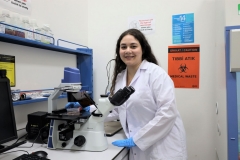
Germany chose Ezgi
Ezgi Kaya, who graduated from Izmir University of Economics (IUE) Department of Genetics and Bioengineering this year, was accepted to the world-famous
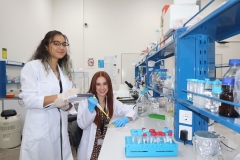
Geneticists’ success in ‘Germany’
Nine newly graduated students from Izmir University of Economics (IUE) Department of Genetics and Bioengineering achieved great success by being accepted to
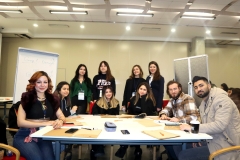
'Sustainable energy' ideas from students
Izmir University of Economics (IUE) organized a workshop on biohydrogen, which is used in many fields from industry to transportation and stands
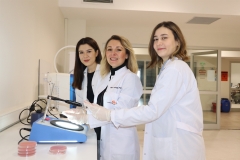
Discovery in thermal spring
Asst. Prof. Dr. Mine Güngörmüşler from Izmir University of Economics (IUE), Department of Genetics and Bioengineering, and two graduate students examined the
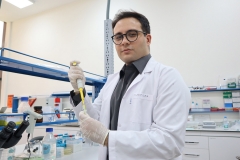
Arda ranked among 7 people in the world
Arda Kıpçak, who graduated from Department of Genetics and Bioengineering, Izmir University of Economics (IUE) this year, was accepted to the world-renowned
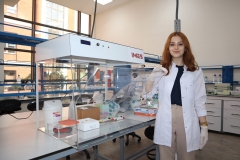
'Smart cabinet' against the virus
Assoc. Prof. Dr. Osman Doluca and his 4 students from Izmir University of Economics (IUE) developed a 'PCR cabinet' that allows samples
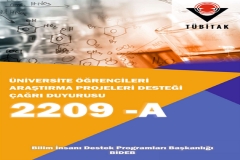
Our Senior Students are Granted Support by TÜBİTAK for Their Graduation Projects
Five of our students are entitled to receive support from TÜBİTAK (The Scientific and Technological Research Council of Turkey) within the scope
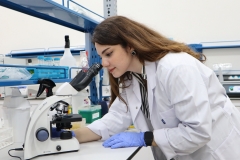
American universities welcome Aydolun with open arms
Aydolun Petenkaya, who completed Izmir University of Economics (IUE) Department of Genetics and Bioengineering as a top student with a full scholarship
